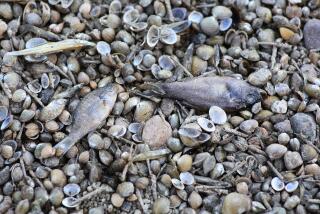Officials, Residents in Milwaukee Struggle With Outbreak of Illness : Health: One of two water treatment plants is closed as a precaution. A protozoan is suspected of sickening hundreds.
- Share via
MILWAUKEE — For the past week, apparently because of tiny organisms in the water system, this has been a city in pain.
At a Cub Foods supermarket on the south side of town, the first sign was a sudden shortage of Kaopectate and Pepto-Bismol. “We couldn’t keep them on the shelves,” said store manager Dennis Lipofski. The same was true all over. “We couldn’t get more products to replace them.” The demand peaked on Monday and Tuesday.
Then, on Wednesday, the city zeroed in on the tap water as the source of the widespread diarrhea, cramps and bloating that had afflicted Milwaukee. Health officials advised residents to boil their water.
And 21,300 gallons of bottled water went out the door that day at Lipofski’s store.
As local authorities try to confirm their suspicion that a protozoan known as Cryptosporidium caused the outbreak--and to find out why it happened, if that is the case--schools and hospitals have taped over drinking fountains and restaurants have set huge vats of water aboil for cooking.
No one is sure how many have been stricken, but health officials said there are probably hundreds and possibly thousands of cases.
One of the city’s two treatment plants, on the south side where the concentration of sickness seems to be greatest, was shut on Friday as a precaution. Testing of water in the system, which serves 800,000 people, has also begun, with results expected in one to four days. The water-boiling warning is expected to stay in place at least through the weekend.
As of Friday, 42 cases of illness had been officially diagnosed as caused by the Cryptosporidium. Milwaukee Mayor John O. Norquist said that the city will test regularly for the parasite now and that he has urged Health and Human Services Secretary Donna Shalala to require all water systems in the nation to do the same.
There is no certain treatment; healthy people must endure a week or two of symptoms. AIDS patients, those receiving chemotherapy and the elderly may take even longer to recover and in fact, Norquist said, “this is a disease that potentially could kill someone.” No fatalities, however, have been linked to this week’s outbreak.
Meanwhile, Norquist said, the city is not ruling out other possible causes of contamination, from viruses to bacteria to a combination of different types of parasites to sabotage, although that last is considered unlikely.
If indeed Cryptosporidium is the culprit, it will not be the first time. In 1984, ground water in a San Antonio, Tex., suburb was contaminated. In 1987, 13,000 people in Carrollton, Ga.--20% of the people in the county--were infected. Last year, about 9% of the residents of Medford, Ore., also fell ill because of the organism, said Walter Jakubowski, chief of parasitology at a Cincinnati lab run by the U.S. Environmental Protection Agency. More than 7,000 cases of gastrointestinal disease caused by the Cryptosporidium were reported in England and Wales in 1989.
It also is a difficult invader to dislodge, Jakubowski said. Chlorination will not disinfect the system, he said. “They’re going to have to flush all the tanks, all the lines. I think they’ll be dumping over the next month or so. To empty every storage tank in a city the size of Milwaukee will take a while.”
The parasite lives in the intestines of cattle, sheep and other warm-blooded animals, and Milwaukee officials have speculated that runoff from a barnyard or slaughterhouse brought Cryptosporidium down the Milwaukee River to Lake Michigan, which the city uses for drinking water.
Such talk has put farmers like Mark Dickmann, who owns 800 hogs and 80 beef cattle, on the defensive.
Dickmann, 40, lives about 20 miles north of Milwaukee. He makes some extra money delivering plastic parts from a nearby factory to the city. On his rounds all week, he said, he has been taking lots of flak. “They say, ‘Your hog manure is getting down to us,’ ” he said. And on Thursday night, someone was videotaping the animals out in the field.
His hogs do cool themselves in Mole Creek, a tributary of the Milwaukee River, and they drink there too--and likely perform other functions as well.
“But it’s not like we’re just doing nothing out here on the problem,” Dickmann said. He has been working for a year now, he said, with the Wisconsin Department of Natural Resources on a plan to confine his hogs indoors and store all their manure.
But the state’s requirements right now will cost him more than $140,000, he said, and he cannot afford that. “They’ve got to subsidize us in some way,” Dickmann said. “I’d like to have clean water too.”
He can take heart, perhaps, from the assessment of Jack Hoffbuhr, deputy executive director of the American Water Works Assn., a Denver-based professional group for water treatment executives.
Nearly all surface water contains Cryptosporidium, Hoffbuhr said.
In Milwaukee’s case, “it does certainly appear at this point that something went wrong with the filtration process,” he said. The most common cause of a Cryptosporidium invasion, Hoffbuhr said, is failure to wash out filters frequently enough.
“This time of year is particularly vulnerable,” he said, “because there’s a lot of runoff. You have to keep on your toes to be sure you have the right combination of chemicals and the filtration you want.”
More to Read
Sign up for Essential California
The most important California stories and recommendations in your inbox every morning.
You may occasionally receive promotional content from the Los Angeles Times.













